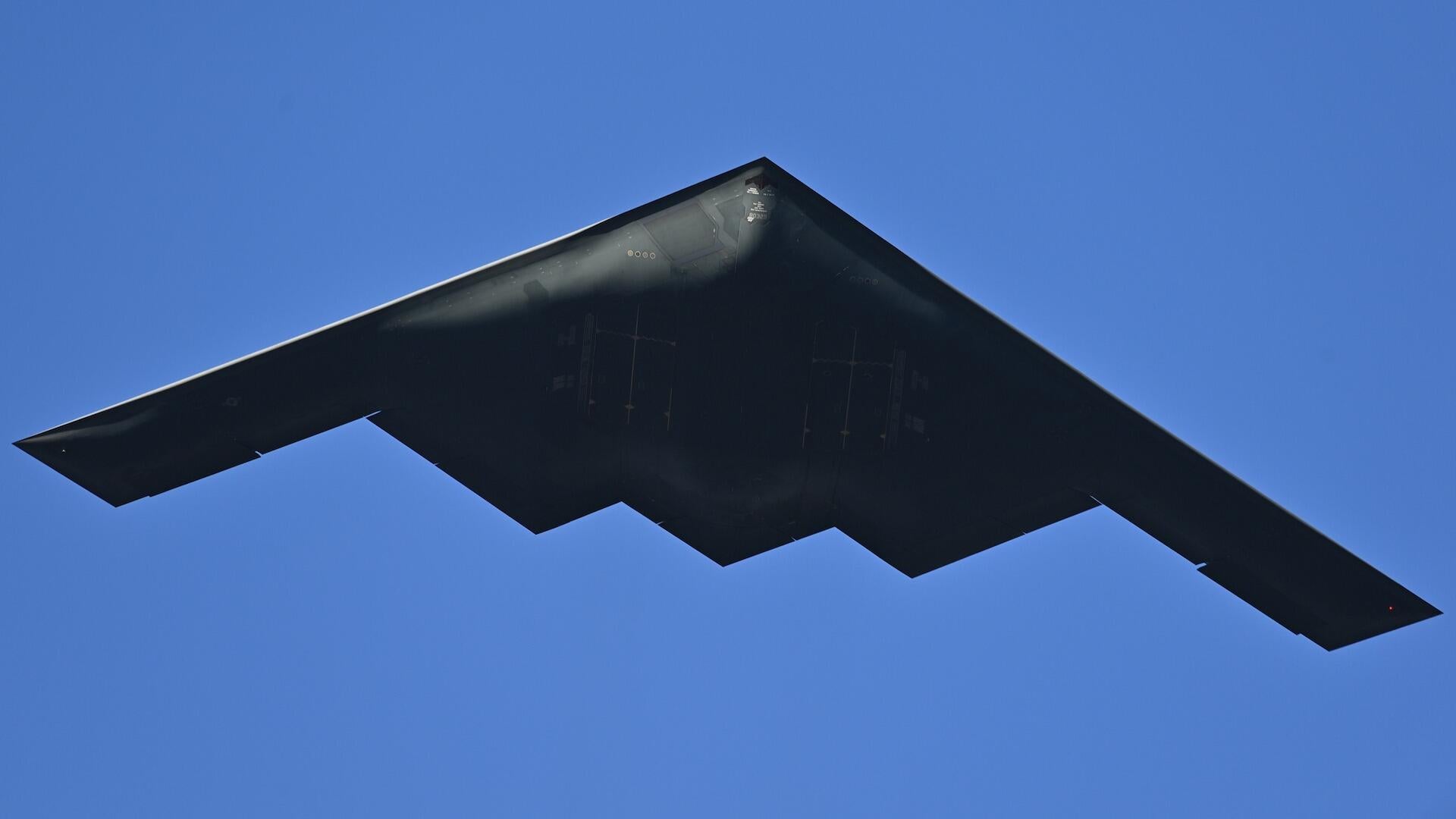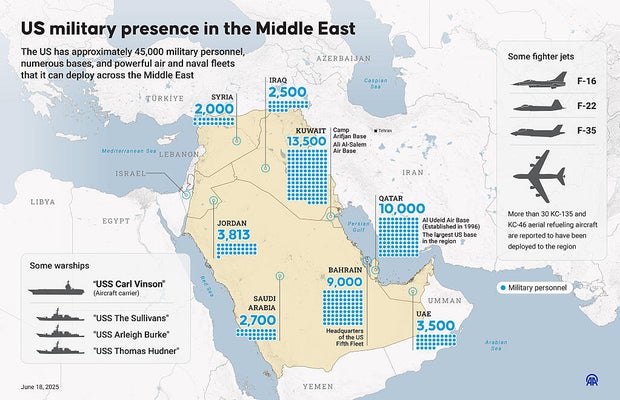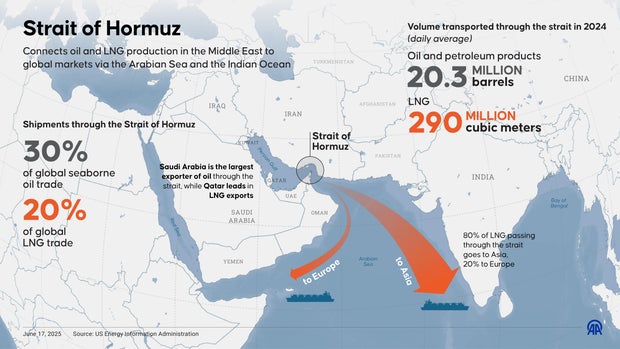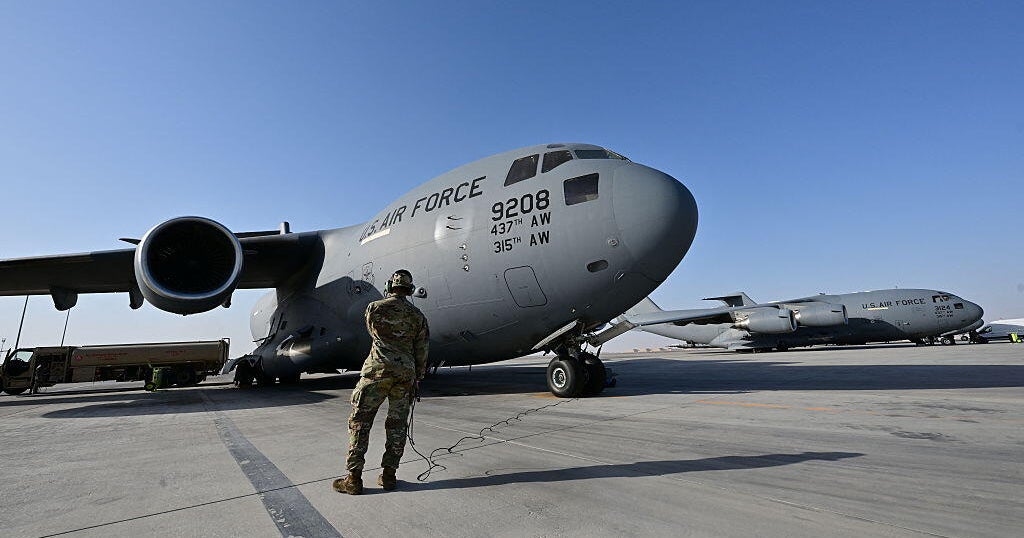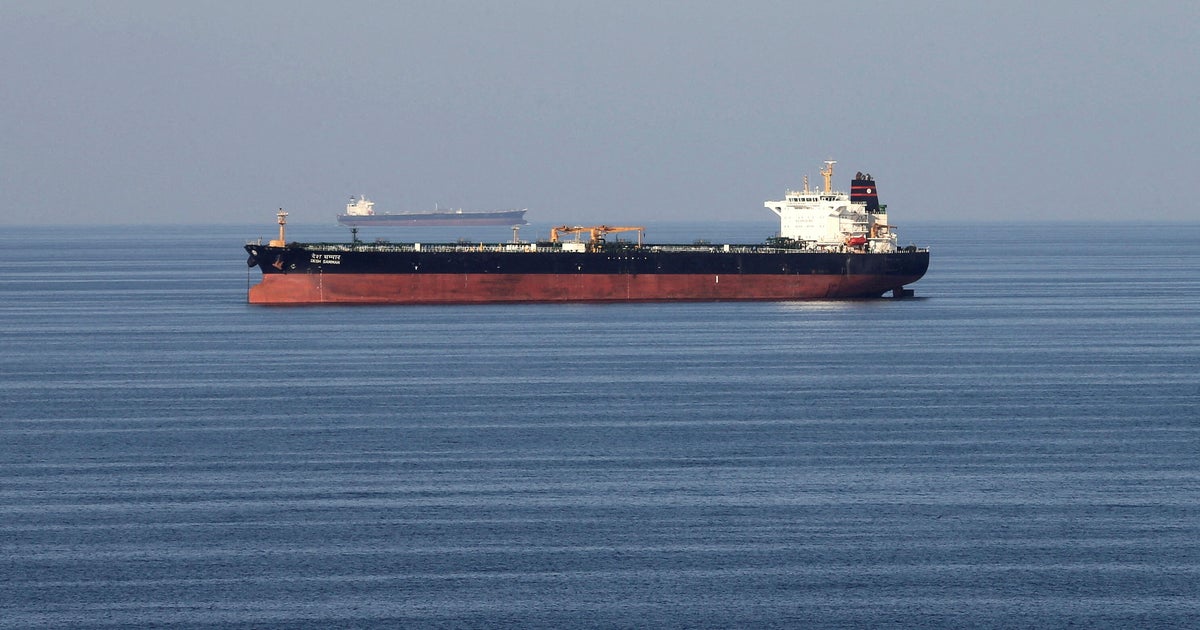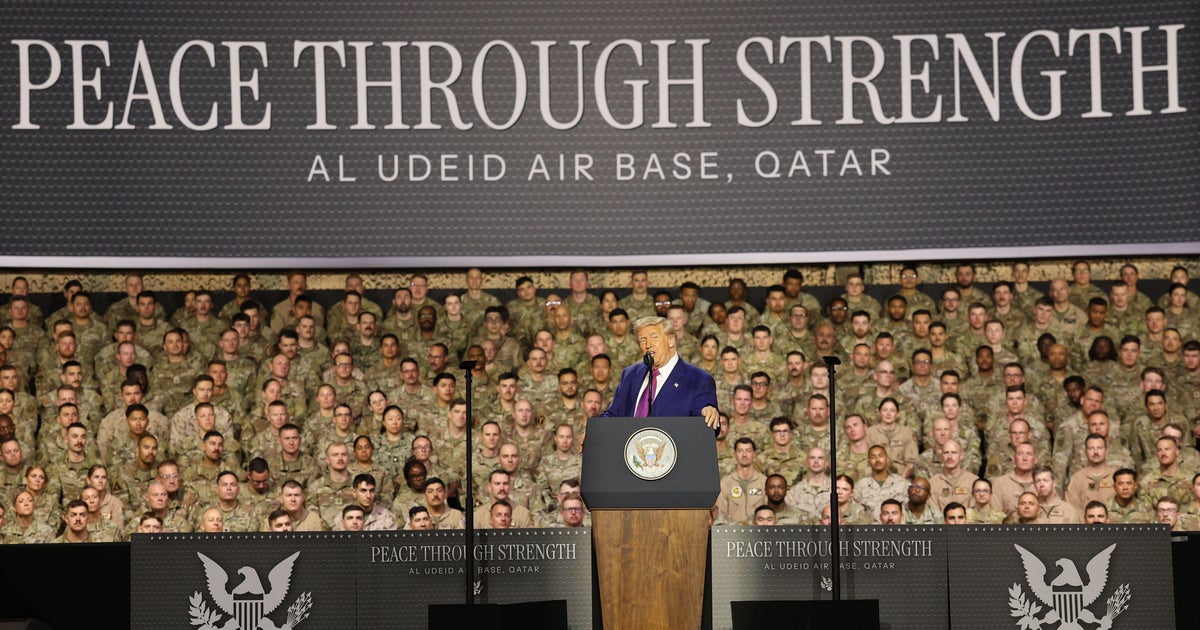Iran threatens retaliation following U.S. strikes. An expert breaks down Tehran's possible targets
Iran announced an operation launching missile attacks against U.S. bases in the Middle East after vowing to retaliate for the Trump administration's surprising strikes on the Islamic state's top three nuclear sites over the weekend.
Missiles were launched targeting the U.S. military bases in Qatar, sources confirmed to CBS News. The missiles were launched soon after Qatar closed its airspace in response to a credible threat to the Al Udeid Air Base outside of Doha. The Associated Press and Reuters reported that explosions were heard over the Qatari capital.
The White House and the Department of Defense told CBS News it was aware of and closely monitoring potential threats to Al Udeid base.
In addition to U.S. air bases, other potential moves by Tehran could include attacking U.S. military assets across the Middle East, closing the Strait of Hormuz, which is a chokepoint for 20% of the world's oil, and carrying out so-called asymmetric warfare that includes terror and cyber attacks around the world.
U.S. military assets in the Middle East
The U.S. operates eight permanent military bases in as many countries across the Middle East — Qatar, Bahrain, Saudi Arabia, the United Arab Emirates, Jordan, Kuwait, Egypt and Iraq — with nearly a dozen more military facilities across the region, according to the Council on Foreign Relations. Chief among these permanent bases is in Qatar at the Al Udeid Air Base with about 10,000 service personnel. Just west, Bahrain is home to a U.S. naval base called Naval Support Activity Bahrain with an estimated 9,000 troops. An estimated 40,000 to 50,000 U.S. servicemembers are stationed across the region.
"There's a range of options in Iran's own target deck," Middle East security expert Burcu Ozcelik at the UK's Royal United Services Institute (RUSI) told CBS News. "Unlike Iran's targeting of Israel, which is far more difficult geographically due to the distance, Iran's stockpile or arsenal of short-range ballistic missiles makes American military installations in the Gulf more vulnerable. They're softer targets in that sense."
Iraq, which shares a nearly-1,000 mile porous border with Iran to the east, "tends to be seen as the next potential frontline in where the conflict can escalate," she said, because of "a number of Iran-linked Shia paramilitary groups" that may act independently from the Iranian government. Such groups have in the past attacked the U.S. Al Asad Air Base in Iraq and the U.S. Embassy in Baghdad.
U.S. naval assets, which include aircraft carriers and their accompanying destroyers, along with various amphibious and other support ships, are also potential targets. The USS Carl Vinson aircraft carrier strike group is currently deployed in the Arabian Sea, while President Trump redirected the USS Nimitz aircraft carrier to the Middle East from the South China Sea. The USS Gerald R. Ford aircraft carrier is also en route. Several U.S. guided-missile destroyers are patrolling the Red Sea, Gulf and Eastern Mediterranean.
These dozens of ships provide possible targets for various forms of Iranian attacks, including "heavily armed speedboats, short-range ballistic missiles, surface to air missiles," said Ozcelik, "that could target American vessels or American allied vessels, similar to what the Houthis have been exercising in the Red Sea. And so Iran would replicate those techniques, but potentially on a larger and more lethal scale."
Strait of Hormuz and 20% of the world's oil
U.S. military assets aside, Iran could cause global economic and energy pain by attempting to choke off passage through the Strait of Hormuz, through which roughly 20% to 25% of the world's oil passes, along with a similar percentage of liquified natural gas. The crucial waterway connects oil-rich Persian Gulf nations to the Gulf of Oman then the world. At its narrowest point, it stretches just 21 miles across, with Iran to the north and Oman and the United Arab Emirates to the south.
Iran's navy could lay thousands of mines to damage ships trying to pass through. RUSI's Ozcelik said this would symbolize a desperate "act of last resort," which would mean Iran is "reeling out of control and spiraling."
"We can consider this as one of those suicide mission type tactics," she said. "If Iran were to go that far, the retaliatory implications would be very costly and also would counter Iran's own interests with respect to its oil export capabilities as well as its relationships with the Gulf ... and its oil trade relationship with China."
U.S. Secretary of State Marco Rubio on Monday called on Beijing to help prevent Iran from closing the strait. On Sunday, Iran's state-run Press TV reported that Iran's parliament, the Majlis, approved a plan to close the Strait of Hormuz but added the final decision would be with the Supreme National Security Council.
Oil analysts predict prices could jump 50-60% if the Strait of Hormuz were closed. One barrel of oil is currently trading in the $70 per barrel range. That could jump to $120. Whether the Organization of Petroleum Exporting Countries, or OPEC, releases more oil to compensate would determine the length of any possible price shock.
"Even if it's for a short term and the Strait of Hormuz is subsequently reopened or Iran doesn't maintain that level of threat for a prolonged amount of time," said Ozcelik. "Iran still would suffer the consequences of that potentially, both in terms of its status, its reliability with the Gulf, as well as the oil infrastructure in the region, which has implications for Iran's own sanction-busting oil trade."
Terrorist and cyber attacks
Ozcelik said the real long-term protracted threat lies in "the asymmetric warfare space and potentially state-sponsored terrorism."
On Sunday, the U.S. National Terrorism Advisory System warned of a "heightened threat environment" in the country. The bulletin did not cite any specific threats but said "low-level cyber attacks against US networks by pro-Iranian hacktivists are likely, and cyber actors affiliated with the Iranian government may conduct attacks against US networks."
The warning came after a pro-Iran hacktivist group, known as "313 Team," claimed credit for a short-lived outage of President Trump's Truth Social messaging platform on Saturday. At about 8 p.m. ET, users who attempted to log in received an error message that said "Network failed" and "Please try again." The platform is back up and running.
Around the world, Iran has been implicated in attempted terrorist attacks. Most recently, in London in May, British authorities arrested several Iranians they allege were planning a terror plot targeting the Israeli embassy. In 2023, also in London, an Iranian plot to kill two Iranian news anchors critical of the regime was also foiled. Other terror plots have been stopped in Cyprus, Germany, Turkey, the United States, Denmark, Belgium and France within the past decade.
Any retaliatory action by Iran, whether it's direct attacks on U.S. assets or closing the strait, would invite a response from the U.S., the Trump administration has warned, which could put the Iranian government's survival at risk.
Mr. Trump, after announcing the attacks on Saturday night, warned Iran against any retaliation, saying, "There will be either peace, or there will be tragedy for Iran far greater than we have witnessed over the last eight days."

